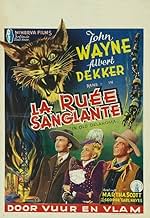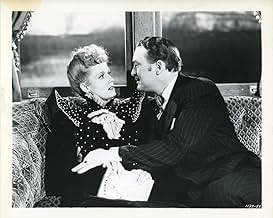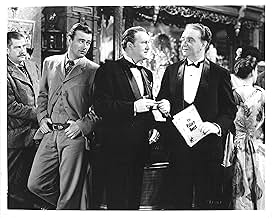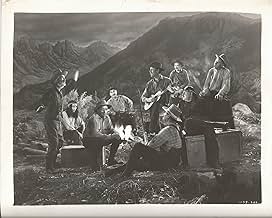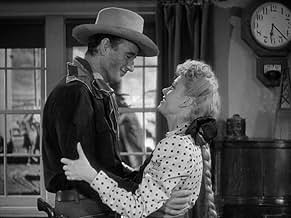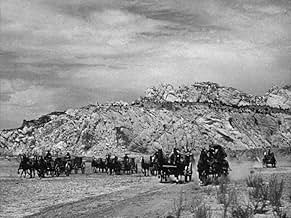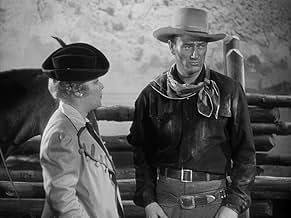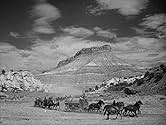IMDb-BEWERTUNG
6,3/10
1664
IHRE BEWERTUNG
Füge eine Handlung in deiner Sprache hinzuIn 1906, on Oklahoma's Indian lands, a cowboy fights for oil lease rights against a greedy oilman while a pretty schoolteacher steals both men's hearts.In 1906, on Oklahoma's Indian lands, a cowboy fights for oil lease rights against a greedy oilman while a pretty schoolteacher steals both men's hearts.In 1906, on Oklahoma's Indian lands, a cowboy fights for oil lease rights against a greedy oilman while a pretty schoolteacher steals both men's hearts.
- Regie
- Drehbuch
- Hauptbesetzung
- Für 2 Oscars nominiert
- 2 Nominierungen insgesamt
Foncilla Adams
- Girl
- (Nicht genannt)
Stanley Andrews
- Mason - Indian Agent
- (Nicht genannt)
Charles Arnt
- Joe - Train Conductor
- (Nicht genannt)
Empfohlene Bewertungen
This film is also very commonly known as "War of the Wildcats". As you watch it, the movie sure looks like a B--but with just a bit more polish, a bit longer running time and a bit more in the way of budget. This is because the film is sort of like a transitional film for Wayne. While he played in a ton of Bs during the 1930s, around 1939 (with "Stagecoach") he began playing in better and better films. But many of them looked a lot like Bs and felt a lot like Bs. His bigger budget studio projects were still a few years ahead.
The film begins with a feminist author (Martha Scott) leaving her tiny town. Apparently the local prudes were angry at her writing such a scandalous romance novel--and you get the impression that it really isn't THAT bad. In fact, it really can't be because Scott is a school teacher and never really lived a worldly life in this town. So, at the urging of the women, she is determined to see the world--and be more like one of her characters. But, she is conflicted and isn't quite sure where to go or what to do. Her dull old aunt wants her to live with her in Kansas City--but when she meets a big-time oil man (Albert Dekker), he convinces her to follow him to the oil fields and promises her wealth and excitement. There are two problems with this. First, Dekker is a bit of a pig and an ego-maniac. Second, John Wayne pops into her life--and back then he was a major hunk. And, since he was the star, it's not especially surprising where it all ends. In the middle portion of the film, Wayne and Dekker vie for power and fight over oil land that the Indians are willing to lease. But Dekker is determined not to play nicely--and seems willing to use some dirty tricks to make sure he alone gets these leases.
Overall, this is not an especially deep film nor is it very realistic. However, it is fun--and that is very important. Gabby Hayes and especially Marjorie Rambeau provide some fun support and color.
The film begins with a feminist author (Martha Scott) leaving her tiny town. Apparently the local prudes were angry at her writing such a scandalous romance novel--and you get the impression that it really isn't THAT bad. In fact, it really can't be because Scott is a school teacher and never really lived a worldly life in this town. So, at the urging of the women, she is determined to see the world--and be more like one of her characters. But, she is conflicted and isn't quite sure where to go or what to do. Her dull old aunt wants her to live with her in Kansas City--but when she meets a big-time oil man (Albert Dekker), he convinces her to follow him to the oil fields and promises her wealth and excitement. There are two problems with this. First, Dekker is a bit of a pig and an ego-maniac. Second, John Wayne pops into her life--and back then he was a major hunk. And, since he was the star, it's not especially surprising where it all ends. In the middle portion of the film, Wayne and Dekker vie for power and fight over oil land that the Indians are willing to lease. But Dekker is determined not to play nicely--and seems willing to use some dirty tricks to make sure he alone gets these leases.
Overall, this is not an especially deep film nor is it very realistic. However, it is fun--and that is very important. Gabby Hayes and especially Marjorie Rambeau provide some fun support and color.
In imdb, it's In old oklahoma.... roku has this as war of the wildcats 1943; the opening credits show wildcats. Stars john wayne, al dekker. When school teacher catherine allen heads west to really experience life, she bumps smack into wildcat oilman jim gardner and cowboy dan somers. Of course, they both chase after her. As well as oil rights. And what kind of a western would this be without gabby hayes? And dale evans in one of her earlier roles. It's silly and fun and moves right along. Better than your average western. Not dry and dusty like so many others. Directed by albert rogell. Nominated for best music and best sound.
John Wayne plays a cowboy who allows himself to be underestimated by wildcatter Albert Dekker. His 'aw shucks' manner like Jimmy Stewart in 'Destry Rides Again' masks a tough, intelligent character who rises to the challenge posed by Albert Dekker's Jim Gardner.
Part of what makes the movie interesting is that the villain, Jim Gardner, is not just a standard heavy. Yes, he's a ruthless businessman, single minded in his drive for success. On the other hand, he's competent and he's no coward. Early in the movie he arrives at one of his well sites and is told there's a mechanical problem. None of his workers seem able or willing to fix it. Disregarding his personal safety, he climbs a rope to the top of the well and fixes the problem.
He's also a close physical match for John Wayne's character, with two long fights. Like it or not, Gardner represents the kind of entrepreneur that built this country. You can't help having a grudging respect for him.
Wayne's Dan Somers has a populist outlook. At the sight of an oil well spouting oil, Martha Scott's Cathy Allen, gushes "It smells like a new day, like prosperity"; Somers replies, "To me it just smells".
Somers saves Gardner from getting shot by a disgruntled farmer, then prevents Gardner from beating up the farmer. Somers seems to represent a 'New Deal' philosophy.
Part of what makes the movie interesting is that the villain, Jim Gardner, is not just a standard heavy. Yes, he's a ruthless businessman, single minded in his drive for success. On the other hand, he's competent and he's no coward. Early in the movie he arrives at one of his well sites and is told there's a mechanical problem. None of his workers seem able or willing to fix it. Disregarding his personal safety, he climbs a rope to the top of the well and fixes the problem.
He's also a close physical match for John Wayne's character, with two long fights. Like it or not, Gardner represents the kind of entrepreneur that built this country. You can't help having a grudging respect for him.
Wayne's Dan Somers has a populist outlook. At the sight of an oil well spouting oil, Martha Scott's Cathy Allen, gushes "It smells like a new day, like prosperity"; Somers replies, "To me it just smells".
Somers saves Gardner from getting shot by a disgruntled farmer, then prevents Gardner from beating up the farmer. Somers seems to represent a 'New Deal' philosophy.
Spanish American War Veteran John Wayne hitches a ride on oil magnate Albert Dekker's private railroad car just as he's putting the moves on traveling school teacher Martha Scott. That sets off a rivalry between them both professional and personal as Wayne gets under Dekker's skin.
Dekker's the big kahuna in Oklahoma territory which would soon be admitted under President Theodore Roosevelt to the union. He's crowding a lot of the small operators out of the field and they see in Wayne a leader and savior.
Later on when Wayne and Dekker compete with the rival proposals for leasing Indian oil lands they go to the White House where Dekker thinks he's got an inside track with the Interior Department. This leads to one of the three best scenes in the film. It turns out that the Duke served in the Rough Riders. The reunion of Wayne and Sidney Blackmer as Theodore Roosevelt is pretty good, who'd have thought Wayne would have had the ultimate inside track.
Dale Evans is in the film, she has a brief role as a saloon entertainer and sings a couple of period songs. She had not yet met her future husband Roy Rogers on the Republic lot, but in fact she was more the westerner than he in real life. He was from a rural Ohio town and she was from Uvalde, Texas. Dale also sang with Anson Weeks band before coming west both literally and figuratively.
Martha Scott is a good crinolined heroine wooed by both Wayne and Dekker. You will also see Grant Withers in one of his few roles in which he wasn't a villain.
Second best scene in the film, John Wayne emptying his pistol into Paul Fix who played one of Dekker's henchmen who actually goes a bit too far because of his personal hatred for Wayne.
Third best scene, the climatic rush to deliver oil by covered wagons and tankers when Dekker buys the pipeline to fulfill the contract. The normally parsimonious Republic studio and its boss Herbert J. Yates broke the piggy bank to stage this one in what was obviously their big budget film of the year. Still plays quite well today.
This is one of John Wayne's better films of the forties. He's given good production values in this western and a perfect role for him. Fans of the eternal Duke should not miss this one.
Dekker's the big kahuna in Oklahoma territory which would soon be admitted under President Theodore Roosevelt to the union. He's crowding a lot of the small operators out of the field and they see in Wayne a leader and savior.
Later on when Wayne and Dekker compete with the rival proposals for leasing Indian oil lands they go to the White House where Dekker thinks he's got an inside track with the Interior Department. This leads to one of the three best scenes in the film. It turns out that the Duke served in the Rough Riders. The reunion of Wayne and Sidney Blackmer as Theodore Roosevelt is pretty good, who'd have thought Wayne would have had the ultimate inside track.
Dale Evans is in the film, she has a brief role as a saloon entertainer and sings a couple of period songs. She had not yet met her future husband Roy Rogers on the Republic lot, but in fact she was more the westerner than he in real life. He was from a rural Ohio town and she was from Uvalde, Texas. Dale also sang with Anson Weeks band before coming west both literally and figuratively.
Martha Scott is a good crinolined heroine wooed by both Wayne and Dekker. You will also see Grant Withers in one of his few roles in which he wasn't a villain.
Second best scene in the film, John Wayne emptying his pistol into Paul Fix who played one of Dekker's henchmen who actually goes a bit too far because of his personal hatred for Wayne.
Third best scene, the climatic rush to deliver oil by covered wagons and tankers when Dekker buys the pipeline to fulfill the contract. The normally parsimonious Republic studio and its boss Herbert J. Yates broke the piggy bank to stage this one in what was obviously their big budget film of the year. Still plays quite well today.
This is one of John Wayne's better films of the forties. He's given good production values in this western and a perfect role for him. Fans of the eternal Duke should not miss this one.
I didn't expect much from this one but it's better than it has any right being. On the surface it looks like an ordinary, run-of-the-mill B western with cowboy John Wayne leading a revolt against greedy oil baron Albert Dekker. Oh and the obligatory pretty school teacher Martha Scott, who catches the eye of both Wayne and Dekker. But it's actually a fun little movie that captures your attention and never drags. Wayne and Dekker play their white hat/black hat parts well, and Scott is charming with a nice chemistry with Duke. Supporting cast features greats like Gabby Hayes, Marjorie Rambeau, and Paul Fix. And just wait until Teddy Roosevelt shows up. That was my favorite part.
Wusstest du schon
- WissenswertesSidney Blackmer made a career out of playing Teddy Roosevelt. He played him eight times in various film projects. 1-"This Is My Affair" (1937) 2-"The Monroe Doctrine" (1939) 3-"Teddy the Rough Rider" (1940) 4-"March On, America!" (1942) 5-"In Old Oklahoma" (1943), 6-"Bill "Buffalo Bill" (1944) 7-"My Girl Tisa" (1948) 8-"Never Kick a Man Upstairs" (TV Movie) (1953).
- Zitate
Bessie Baxter: We've got a long way to go, and a short time to get there.
- VerbindungenEdited into Six Gun Theater: In Old Oklahoma (2021)
Top-Auswahl
Melde dich zum Bewerten an und greife auf die Watchlist für personalisierte Empfehlungen zu.
- How long is In Old Oklahoma?Powered by Alexa
Details
- Laufzeit
- 1 Std. 42 Min.(102 min)
- Farbe
- Seitenverhältnis
- 1.37 : 1
Zu dieser Seite beitragen
Bearbeitung vorschlagen oder fehlenden Inhalt hinzufügen

